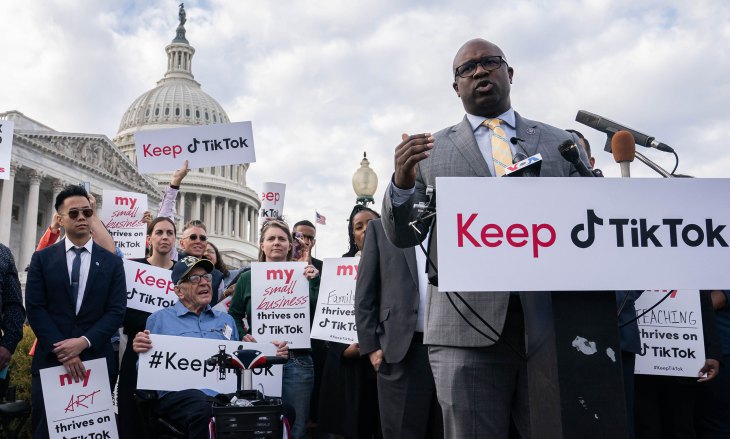To TikTok or not – the privacy risks

Lockdown was a wild time. Confined to our homes, we experimented with various ways to escape boredom’s persistent grip. Many of us danced in front of our smartphones and shared the footage of our flailing limbs on TikTok for all the internet to enjoy. In a time of unprecedented global frenzy, scrolling through your newsfeed showed a jarring contrast between fear-mongering media headlines and Jenny from HR attempting a pantomimed twerk to Madonna’s ‘Like a Virgin’. Again, it was wild.
However, with lockdown a thing of the past, over a billion users are still hooked on the platform and continue to use it to consume, send and receive content via short-form video infotainment. But there are growing fears this powerful tool is playing an intentional role in shaping the perspectives of its Western users while having access to their sensitive data.
A recent US congressional hearing involving TikTok’s CEO Shou Zi Chew has cast doubt over the platform’s future in the United States as a potential ban looms.
So, what are the security risks that TikTok poses for users, and should you care?
About TikTok
TikTok is the world’s most popular short-form video-sharing social media platform. With over 3.5 billion installations and a whopping 1.7 billion active monthly users, the app is available in over 150 countries and tops worldwide download lists in both Google Play and Apple App stores.
TikTok is owned by the Chinese tech company ByteDance. Previously launched with a different name in 2017, TikTok gained global prominence after acquiring Music.ly, a lip-syncing app popular in the US, in 2018. Since the merger, it consolidated its global audience and experienced a 400% year-over-year increase in first-time installs, reaching 740 million new users in 2021.
Behind the twerks and recipe how-to’s, TikTok is a powerful content recommendation machine. Its success and popularity are largely due to its high personalisation and interest-based recommendation algorithms that give users precisely what they want based on their usage data.
And this is where the problem arises, according to Western policymakers.
Technology vs Politics

The United States’ FBI has expressed “national security concerns” over American citizens’ usage of TikTok, stating that the Chinese government could use the platform to influence their perspectives and control their devices. As ByteDance is a Chinese company, there are fears that the data it collects from its global user base might be acquired by the ruling Communist Party.
In 2020, a national security review by the Committee on Foreign Investment in the United States (CFIUS), ordered ByteDance to divest from TikTok. Even then-President Donal Trump unsuccessfully tried to ban the app in the US.
Recently, US lawmakers have introduced a bill that would ban the platform in the country, citing security risks from user data control and the weaponisation of the recommendation algorithm to perform influence operations. India banned the app some two years ago, citing similar concerns over privacy and Chinese surveillance.
Now, Europe is also raising similar privacy concerns over the Beijing-based app. Instead of amusing dance routines, there are fears the platform will beguile users in Western society to march to a Socialist drum through Communist propaganda peddled by the Chinese government.
The EU Commission has banned the use of TikTok on all work devices, including personal devices that use corporate apps, citing data protection concerns. NATO has followed suit, requesting all employees remove the app from NATO-issued devices.
TikTok fights back
However, TikTok CEO Shou Zi Chew has been fervently trying to counter these concerns by undergoing numerous high-level meetings with policymakers in both the USA and EU. Chew has laid out plans to comply with the EU’s new set of twin regulations, the Digital Services Act (DSA) and the Digital Markets Act (DMA). Furthermore, TikTok is aiming to secure a deal with United States regulators that will ensure user data is free from Chinese government interference.
Despite these efforts, speculation over privacy concerns, data control, and surveillance remains strong in the West. This is fuelled by an admission that certain ByteDance employees have access to the personal data of users outside of China.
In March, Chew underwent televised questioning by US Congress to address the concerns over data protection, youth safety, and TikTok’s ties with the Chinese government. The hearing highlighted the complexity surrounding these issues, showing that there is no linear approach to solving the issue.
As of 14 April 2023, there is no resolution to the calls to ban the app in the US as there is a litany of legal hurdles to overcome to make this a reality. But there are reports that a few U.S. states and colleges have already begun banning TikTok on official devices in recent months.
Western pushback

It seems that the TikTok CEO has won over a large portion of American audiences with his eloquent and professional handling of the televised Congressional hearing. Users took to the platform to declare their support for Chew and defended him against “unfair questioning” and “tech-illiterate” lawmakers. To some, this is a display of defiance against out-of-touch policymakers. To others, it proves the concerns over the app’s ability to shape users’ perspectives for Socialist sympathy right.
Progressive politicians are fighting against the ban and are raising their concerns over the potential bans of other social media platforms that the RESTRICT, Act aims to execute. Politicians are citing free speech concerns and that a ban will muzzle political conversations among the youth.
Unsurprisingly, the global creator community have also raised their concerns over the US and Europe’s plans to ban TikTok. US TikTok audiences account for the majority of views for global creators with the platform announcing that there are 150 million American TikTok users. If the ban comes to fruition, that means a large contingent of creators’ fan base will disappear. This could potentially impact the livelihoods of creators who provide content specifically for US and European audiences.
The problem with banning TikTok and other apps
TikTok is widely successful because it is democratic at its heart. It bypasses language and cultural barriers and connects people from all over the world through human-centric activities, such as music, dancing, and memes. Recommendations are based on interest, meaning like-minded people from the other side of the world will enjoy the same content.
Of course, attempting to ban any app or platform leads to a less open internet, which is directly against the democratic foundations upon which it was created.
But a growing number of governments are pushing for internet sovereignty through policies and regulations that could threaten the openness of the internet. Russia’s enclosed “intranet”, India’s regular internet shutdowns during social unrest (and banning of TikTok), and the US and EU’s efforts to regulate TikTok, are some of the ways our open access to the internet is under threat.
The US’s RESTRICT, Act aims to ban not only TikTok but all technology companies from countries outside the United States identified as ‘countries of concern’.
This type of continued regulation will lead to the splinternet, where a user’s experience of the internet is determined by their location and what information the government allows access to. While the problems facing our open internet are significant – data breaches, cybersecurity risks, misinformation, etc. – governments should be tackling these issues directly, rather than indirectly through internet sovereignty.
To TikTok or not
Has our privacy been beguiled by our own narcissism and digital comforts? In many ways, yes. But this is precisely why you shouldn’t have a problem using TikTok.
You see, our appetite for social media has already seduced us into handing over our personal data to tech companies in both the East and West. The apps which the majority of the world uses every day – Facebook, Instagram, Snapchat, Google, YouTube, WeChat, Alipay, etc. – already own our user data. And not through cloak-and-dagger approaches either, with our consent.
Are these tech companies influenced in some way by the governments of the countries in which they operate? Perhaps. But all companies are. Why worry about the privacy risks of one company over another based purely on geography?
We consent to our data being gathered by the platforms and apps we willingly download. But the data is mostly used to enhance our digital experience and make our lives easier. We shop, learn, socialise, date, bank, and conduct much of our lives using these tools. To tailor our experiences, these apps need to learn about us through our usage data.
That’s a pretty small price to pay to have access to the most powerful tools known to mankind, wouldn’t you agree?
Paula Ferrai
Working Machines
An executive’s guide to AI and Intelligent Automation. Working Machines takes a look at how the renewed vigour for the development of Artificial Intelligence and Intelligent Automation technology has begun to change how businesses operate.







